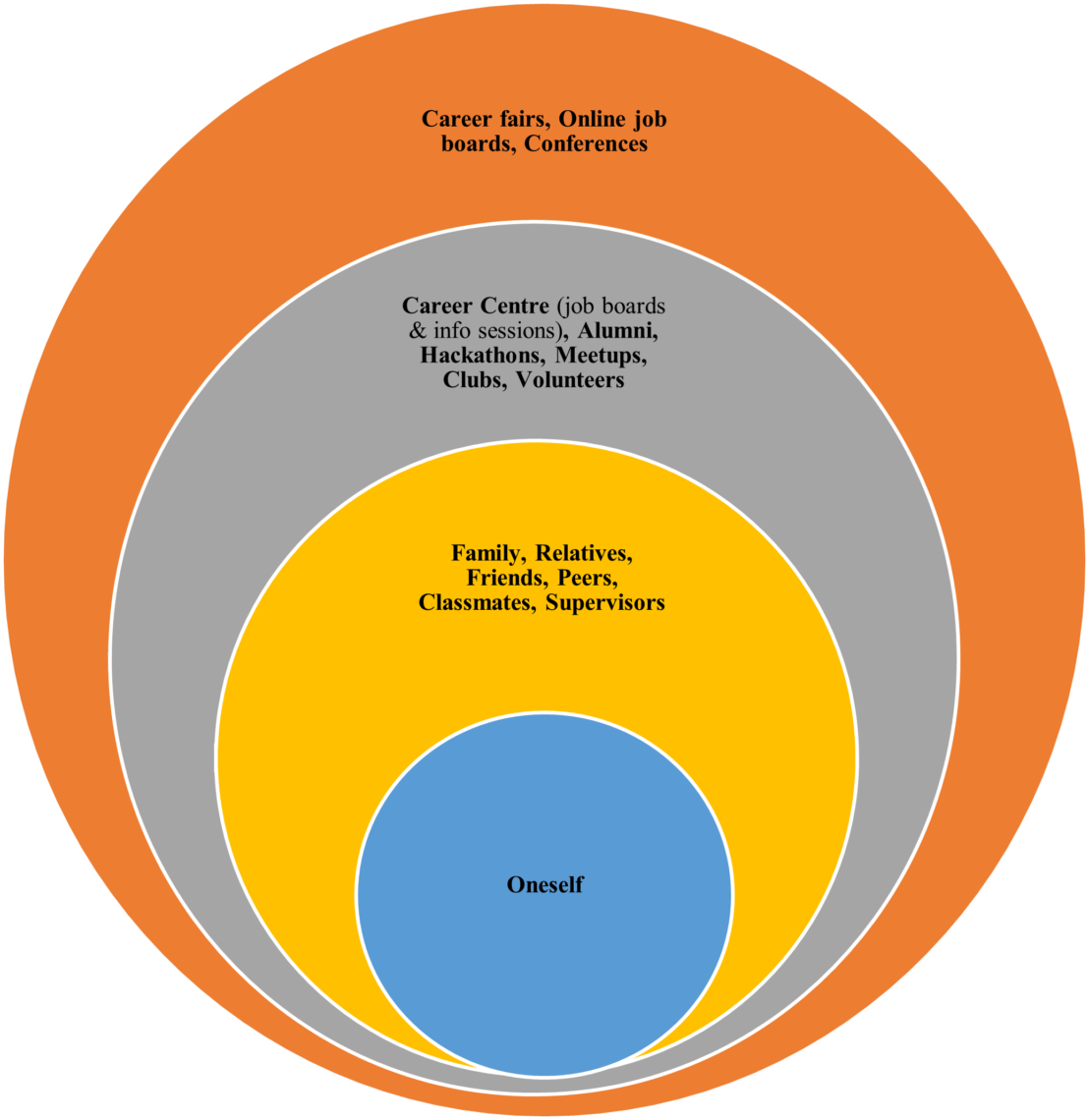Building Connections and Working at Start-Ups
By Shu-Feng Tsao
May 7, 2021
After spending 5 years in the United States for my two master’s degrees and work, I started my PhD program in Fall 2020 at the University of Waterloo. I had to start my program remotely since my study permit approval came the day after Canada closed its borders on March 18, 2020 due to the COVID-19 pandemic. Although it was disappointing to hear that I wouldn’t be able to immediately study physically in Canada, this experience did remind me of times when I had to be flexible and open-minded. In fact, I rarely imagined that I’d work for a start-up, followed by joining a new team within a health insurance corporation after I graduated from my second master’s in the US. As international students, we generally face additional challenges to secure jobs. Therefore, working for a start-up appeared to be a good option because in my experience, they are generally more flexible and open-minded when it comes to hiring international students as compared to big companies. Now, where should we start if we want to step into the world of start-ups?
How to build connections with start-ups
During my first master’s in nutrition, I realized word choices truly make a big difference. For example, I once recommended “exercise” for weight loss for a patient, but they immediately linked “exercise” with something physically demanding. As a result, they were less willing to even consider starting to go for a 10-minute walk twice a week. However, if instead I recommended “physical activity”, I noticed that patients would be more willing to try the walking regimen. Similarly, if the term “networking” sounds very stressful to you, looking and approaching it from a different perspective can help. Consider “networking” as “building connections” or “making friends” with start-ups, without feeling the pressure of “networking” with them before you’re actually in the job market. Starting from someone close to you, and gradually expanding to others outside your close circles is one way to do this (Figure 1).

Start with friends, family, and relatives
These are relatively close connections that we already have and know us well, so it’s easier to start with them to have casual conversations and explore what start-up opportunities they know in their networks. Perhaps your parents are actually investing in a start-up, but you don’t know because you have never asked. Perhaps one of your friend’s cousin or aunt is working for a start-up of your interest. You can therefore request an informational interview, a conversation in which we seek insights on a career path, an industry, a company and/or general career advice from someone with experiences and knowledge in the areas of interest. It can be done informally as a coffee chat, but it requires some preparations like we do for job interviews. However, this time is we the students that actively ask questions.
Build and maintain good relationships with your peers, classmates, and supervisors
At the graduate student level, it’s common to have several part-time students in your cohort or classrooms. If you have a chance to work with any part-time student for a group project or other assignments, stay connected with them even after the project or course is over. While part-time students are usually very busy because they have a full-time job, they may be exposed to start-up opportunities that are not under your radar. Perhaps their organization is under restructure to create new teams (like a start-up within a corporation). Likewise, your supervisor may be a founder or co-founder for a start-up, or your peers and classmates may want to initiate a start-up based on their research. You never know what surprises you would get from them.
Use the Centre for Career Action resources
Job postings and employer info sessions are great resources for people interested in start-ups. It’s likely that when you Google a company’s name, you might realize that they are a start-up. Besides, these start-ups tend to have a close tie with the university because their early employees or founders are alumni. The CCA’s workshops are also helpful in addition to their one-on-one appointments.
Connect with alumni
In addition to the university-wide alumni events, each program or faculty may have their own events to connect current students with alumni. Participate in these sessions and connect or follow-up with alumni on LinkedIn or email afterwards. You can also check where they work and conduct informational interviews after you establish such connections.
Participate in extra-curricular activities
Volunteering, participating in hackathons, joining clubs, and many other activities are great ways to expand our connections. Hackathons are especially useful if one is very interested in entrepreneurship and start-ups. Perhaps you might be afraid of joining a hackathon because you feel that you can’t contribute anything due to lack of knowledge? No worries! My advice is to just give it a try. You can start with attending their networking hour only to talk with entrepreneurs without really joining its competition and this would be completely acceptable. In fact, it’s common to see a good portion of participants who registered for a hackathon later to show up just to enjoy free drinks, food, and networking. During my second master’s, a hub that helps foster start-ups was right across the street from my campus. Since it was so convenient, I basically stayed for many weekends and evenings for its events and hackathons. It was an eye-opening and fun experience to talk and work with smart and inventive people.
How to get a start-up job
Before we get serious about working for a start-up, one needs to recognize at least two facts. One is that start-up salaries are generally not as high as big corporations, even though start-ups can successfully receive millions of investments. If you want equity, like shares of the start-up, you’d receive even less salary. The other fact is that usually a start-up career is not a typical 9 to 5 job. Therefore, if a person wants a good work-life balance it might be more difficult to maintain working for start-ups. If these two facts don’t push you away, here are some tips for you to get a job in start-ups:
- If you have successfully established your connections described in the previous sections, simply let your networks know that you’re looking for job opportunities. You can inform your networks as early as 1 year before you graduate or really step into the job market. If you already have a list of start-ups that you would like to work for, reach out to them early.
- Apply for jobs available on Centre for Career Action’s WaterlooWorks, info sessions, and career fairs. If an employer is actively involved in such campus recruitment at our university, it definitely signals that this opportunity is something that we should take advantage of. In fact, I got several job offers a month before my graduation from my second master’s degree because I applied for jobs via the school’s job board. I eventually chose to work for a start-up.
- Apply for jobs available online. LinkedIn and Indeed are probably the most common platforms that people search and apply for jobs. However, start-up jobs are often posted elsewhere on lesser well-known websites, such as AngelList. Although it’s common to apply for a job via these online platforms, you can make yourself stand out if you can add a referral in addition to a customized resume and cover letter. A referral means an employee within the company agrees that you can put their name as a referral on your application. This is like a recommendation letter from your supervisor without a real letter.
- Keep networking while applying for jobs. Like learning or connection building, networking is a life-long activity that shouldn’t stop, but one can change our focus intensity. That is, we should choose and participate in events with a job-searching purpose more frequently. For instance, we can still attend info sessions like we previously did. However, instead of trying to build connections, this time one should look for a job seriously and ask questions about the job opening.
- Start your own start-up. This may scare many people when they first hear this. However, if you already want to work in a start-up, why not be your own boss? Why not consider brushing up on your own clever ideas or research? You can also collect ideas from your friends or colleagues and come forward as a team. Our university has been very supportive to foster innovations and bring research to commercialization by offering many opportunities such as Concept 5K, coaching, and other funding from Concept UWaterloo.
Although how to start one’s own start-up is beyond the scope of this blog, I’m interested in connecting and knowing stories from anyone who wants or has previously worked with start-ups. I hope this blog will help any graduate students especially international students like me who want to pursue a start-up career.
About the Author: Shu-Feng Tsao (she/her) is PhD student in Public Health Science, Faculty of Health. She stayed in the United States for 5 years to earn two master’s degrees and work in a start-up and a global health insurance company. Currently her doctoral research focuses on health informatics, especially about social media infodemics by analyzing social media data using machine learning and AI. She also runs a journal club/interest group about digital health. Please feel free to connect with her on LinkedIn or email (s7tsao@uwaterloo.ca).
